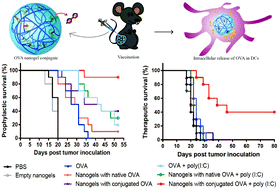Strong in vivo antitumor responses induced by an antigen immobilized in nanogels via reducible bonds†
Abstract
Cancer vaccines are at present mostly based on tumor associated protein antigens but fail to elicit strong cell-mediated immunity in their free form. For protein-based vaccines, the main challenges to overcome are the delivery of sufficient proteins into the cytosol of dendritic cells (DCs) and processing by, and presentation through, the MHC class I pathway. Recently, we developed a cationic dextran nanogel in which a model antigen (ovalbumin, OVA) is reversibly conjugated via disulfide bonds to the nanogel network to enable redox-sensitive intracellular release. In the present study, it is demonstrated that these nanogels, with the bound OVA, were efficiently internalized by DCs and were capable of maturating them. On the other hand, when the antigen was just physically entrapped in the nanogels, OVA was prematurely released before the particles were taken up by cells. When combined with an adjuvant (polyinosinic–polycytidylic acid, poly(I:C)), nanogels with conjugated OVA induced a strong protective and curative effect against melanoma in vivo. In a prophylactic vaccination setting, 90% of the mice vaccinated with nanogels with conjugated OVA + poly(I:C) did not develop a tumor. Moreover, in a therapeutic model, 40% of the mice showed clearance of established tumors and survived for the duration of the experiment (80 days) while the remaining mice showed substantial delay in tumor progression. In conclusion, our results demonstrate that conjugation of antigens to nanogels via reducible covalent bonds for intracellular delivery is a promising strategy to induce effective antigen-specific immune responses against cancer.


 Please wait while we load your content...
Please wait while we load your content...